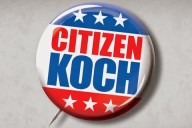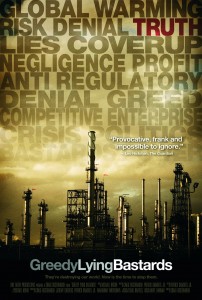Interview: Carl Deal and Tia Lessin of the Documentary “Citizen Koch”
Posted on June 19, 2014 at 8:00 am
“Citizens United has unleashed money that our disclosure laws are not equipped to reveal.” Tia Lessin and Carl Deal wanted to make a documentary about the toxic effect of corporate money on politics following the Supreme Court’s decision in Citizens United that invalidated just about every law controlling campaign contributions. But it ended up focusing on private money — mostly from the Koch brothers, who have spent hundreds of millions of dollars, much of it undisclosed before voting day. I spoke to Deal and Lessin about making the film.
How did this project get started?
Tia: We were really curious. David Koch ran for Vice President in 1980, on a Libertarian ticket. This was a fringe, fringe party. Not at all part of either major national party at the time.
Carl: They made Ronald Reagan look like a flaming liberal.
Tia: His platform was abolished Social Security Medicare and Medicaid, the Postal Service, taxes, of course; corporate and personal taxes. Now a lot of those tenets have become mainstream within the Republican party. He’s no longer part of the Libertarian party, he’s part of the Republican party and so we were curious to understand how that happened. A big part of the way that happened was his seed funding, the Tea Party. And hijacking what might have been actually legitimate populous concern over Wall Street and the power of the banks and the economic implosion after the mortgage crisis.
People on both sides of the aisle were concerned about that and concerned about the lack of accountability. And the Kochs and their brethren I think hijacked that and saw the value in boots on the ground because that’s the one thing that they lacked. All this time they had the money, they had the strategy, they had their dupes and their political players in Washington but they didn’t have boots on the ground; they didn’t have any popular support. They always fabricated that, they pretended to have that. They had Astroturf but the Tea Party gave them the people and then they began to fund it. So we were curious on how that happened. We learned that that happened and how it was that true believers on the ground were allowing these, the two richest men in the country, if you put their wealth together; they are the two richest men in the country, in the world actually, to tell them what to do.
What percentage of what the Koch brothers are doing do you believe is pure policy and what percentage is just an way for them to make more money?
Carl: That’s a billion-dollar question right there!
Tia: If it’s ideology, then it can also very conveniently makes you a richer. All the better right? I mean what’s the difference in ideology and greed? I feel like every one of their ideological positions also has a profit and benefit of making them and other companies richer.
What are their core positions?
Tia: The regulation of the financial sector, the regulation of the economy, of their industries. They want to do away with the EPA and the very government functions that provide oversight for their businesses. Those are primary and then they don’t believe in government; they believe in privatizing the conscience of government. And whether it be our schools, our healthcare, whatever else they believe in, they are very anti-union, they are anti-collectivists; In their dad’s day, that was anti-communist but now they have adopted this term “collectivist”. Well what does that mean? They don’t believe in people banding together to negotiate over their wages. And I don’t think it’s ideological either. I think that there is an element of cynical political maneuvering. I mean, that’s what we see in our film. It’s not about pensions, it’s not about wages, they want to kneecap the labor unions so that they don’t contribute to liberal politicians.
Is there a difference between the Koch brothers and contributors to Democrats like George Soros and labor unions?
Carl: They have more money and the way they spend their money is different. George Soros has a political agenda and he spends money on certain types of candidates; there is no doubt about it. But the kind of philanthropy that he gave, that he engages in is a little bit different than the kind of quote unquote philanthropy that the Kochs engage in.
Tia: The bottom line is, there is a difference in spending between billionaires and unions. I think the media equates those two. They are not equal. The Unions do not spend as much as the Kochs. They spend on a different scale but they also represent real working people. The Kochs, they are two guys, they are two men. The other difference in between spending of Labor and spending of the Kochs — Labor has to disclose every penny it spends.
Carl: They don’t even have a responsibility to the shareholders. They are part of a private corporation.
Tia: They have the right to speak. The unions have the right to speak. They have the right to speak as human beings. But why should the speech of those two men trump the speech of millions of working people? I think yes, Soros, whoever it is; the Hollywood folks who spent a lot of their monies, Tom Steyer and Jeffrey Katzenberg. Why is it that any rich person has more of a voice or gets to speak louder because they have this money to amplify their voice? Why is that fair to everybody else? And in the end I think the big problem is that the politicians owe them something at the end of the day.
Carl: I think you also look at how a lot of the billionaires on the left are spending their money versus the way the billionaires on the right are. Tom Steyer and George Soros are building infrastructure, they want more government. They are interested in creating a bigger safety net and working for the betterment of everyone. The Kochs and their kind are about themselves; it’s a shell game they have created. Look, I think it’s straight up a cheating in a way. They took a look at the playing field and they saw where they were losing and then they figured out how they can strategically over time rig it in their favor. And that’s one of the reason why we looked at Citizens United so closely in this film. It was a marker; it was a signpost where there was democracy before Citizen United and there is less democracy after.
The surprise hero of the film is a politician who has held office as both a Democrat and a Republican, Buddy Roemer.
Carl: And he was a “right to work” governor. He is no friend of organized labor.
Why aren’t people more up in arms over this?
Tia: I think people are. It makes you sick and tired and kind of don’t want to vote. You feel sick of it. One guy in our movie votes for the first time and then he finds out all this money got poured into the election and he is like, “Never again. This is the first and the last time I am going to vote.” Two things; people don’t want to vote and when they see what’s happened in the state houses and in the Congress, this divisiveness and this extreme conflict and disinterest in negotiating on the part of these Two Party radicals, they feel that government has broken down. And I think that’s exactly what the Tea Party and the Kochs want people to believe, government has broken down. So it serves their agenda.

